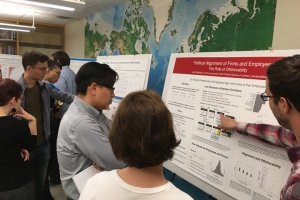
In Song Kim
Associate Professor of Political Science
Political methodology; international trade; political economy; big data; machine learning; game theory; lobbying; lobbyview; visualization; dimension reduction.
Biography
In Song Kim is Associate Professor of Political Science at the Massachusetts Institute of Technology. He completed his Ph.D. in Politics at Princeton University. His research interests include International Political Economy and Formal and Quantitative Methodology. His research focuses on the political economy of lobbying and campaign donation, estimation of political preferences, and causal inference with panel data. His dissertation won the 2015 Mancur Olson Award for the Best Dissertation in political economy. An article version of this research received the 2018 Michael Wallerstein Award for the best published article in political economy. In Song Kim conducts Big Data analysis of international trade. He is developing methods for dimension reduction and visualization to investigate how the structure of international trade around the globe has evolved over time. His work has appeared and is forthcoming in various academic journals, including the American Political Science Review, American Journal of Political Science, Annual Review of Political Science, International Organization, International Studies Quarterly, Political Analysis, and The Journal of Politics.
Research
Professor Kim is broadly interested in international political economy and political methodology. His current research interests include firm-level lobbying on trade policies, product-level trade policy-making, and the interaction between domestic political institutions and international trade. Professor Kim is also interested in the development of quantitative methods for causal inference with panel data, "big data" analysis, network models, and estimating political actors' preferred policy outcomes. He is developing a large-scale database on lobbying supported by the National Science Foundation.
Recent Publications
“Political Cleavages within Industry: Firm-level Lobbying for Trade Liberalization” American Political Science Review (2017), Vol. 111, No. 1, pp. 1-20.
“The Charmed Life of Superstar Exporters: Survey Evidence on Firms and Trade Policy” Journal of Politics (2017), Vol. 79, No. 1, pp. 133-152. (with Iain Osgood, Dustin Tingley, Thomas Bernauer, Helen V. Milner, and Gabrielle Spilker)
“Estimating Spatial Preferences from Votes and Text” Political Analysis (2018), Vol. 26, No. 2, pp. 210-229. (with John Londregan and Marc Ratkovic)
“Firms and Global Value Chains: Identifying Firms’ Multidimensional Trade Preferences” International Studies Quarterly (2019), Vol 63, No. 1, pp. 153-167. (with Helen V. Milner, Thomas Bernauer, Iain Osgood, Gabrielle Spilker, and Dustin Tingley)
“When Should We Use Unit Fixed Effects Regression Models for Causal Inference with Longitudinal Data?” American Journal of Political Science (2019), Vol 63, No. 2, pp. 467-490. (with Kosuke Imai)
“Firms in Trade and Trade Politics” Annual Review of Political Science (2019), Vol 22, pp. 399-417. (with Iain Osgood)
“The Effects of Political Institutions on the Extensive and Intensive Margins of Trade” International Organization, (2019), Vol 73, No. 4, pp. 755-792. (with John Londregan and Marc Ratkovic)
“Measuring Trade Profile with Granular Product-level Trade Data” American Journal of Political Science, (2020), Vol 64, No. 1, pp. 102-117. (with Steven Liao and Kosuke Imai)
“Mapping Political Communities: A Statistical Analysis of Lobbying Networks in Legislative Politics” Political Analysis, (2021), Vol.29, No.3, pp.317-336 (with Dmitriy Kunisky)
“On the Use of Two-way Fixed Effects Regression Models for Causal Inference with Panel Data” Political Analysis, (2021), Vol.29, No.3, pp.405-415 (with Kosuke Imai)
“Learning Bill Similarity with Annotated and Augmented Corpora of Bills” Empirical Methods in Natural Language Processing (EMNLP). (2021) (with Jiseon Kim, Elden Griggs, and Alice Oh)
“Matching Methods for Causal Inference with Time-Series Cross-Section Data” Forthcoming at American Journal of Political Science (with Kosuke Imai and Erik Wang)
Teaching
| 17.464 | IPE of Advanced Industrial Societies |
| 17.800 | Quantitative Research Methods I: Regression |
| 17.804 | Quantitative Research Methods III: Generalized Linear Models and Extensions |
| 17.806 | Quantitative Research Methods IV: Advanced Topics |
| 17.810/811 |
Game Theory and Political Theory |
| 17.835 | Machine Learning and Data Science in Politics |
News
Biography
In Song Kim is Associate Professor of Political Science at the Massachusetts Institute of Technology. He completed his Ph.D. in Politics at Princeton University. His research interests include International Political Economy and Formal and Quantitative Methodology. His research focuses on the political economy of lobbying and campaign donation, estimation of political preferences, and causal inference with panel data. His dissertation won the 2015 Mancur Olson Award for the Best Dissertation in political economy. An article version of this research received the 2018 Michael Wallerstein Award for the best published article in political economy. In Song Kim conducts Big Data analysis of international trade. He is developing methods for dimension reduction and visualization to investigate how the structure of international trade around the globe has evolved over time. His work has appeared and is forthcoming in various academic journals, including the American Political Science Review, American Journal of Political Science, Annual Review of Political Science, International Organization, International Studies Quarterly, Political Analysis, and The Journal of Politics.
Research
Professor Kim is broadly interested in international political economy and political methodology. His current research interests include firm-level lobbying on trade policies, product-level trade policy-making, and the interaction between domestic political institutions and international trade. Professor Kim is also interested in the development of quantitative methods for causal inference with panel data, "big data" analysis, network models, and estimating political actors' preferred policy outcomes. He is developing a large-scale database on lobbying supported by the National Science Foundation.
Recent Publications
“Political Cleavages within Industry: Firm-level Lobbying for Trade Liberalization” American Political Science Review (2017), Vol. 111, No. 1, pp. 1-20.
“The Charmed Life of Superstar Exporters: Survey Evidence on Firms and Trade Policy” Journal of Politics (2017), Vol. 79, No. 1, pp. 133-152. (with Iain Osgood, Dustin Tingley, Thomas Bernauer, Helen V. Milner, and Gabrielle Spilker)
“Estimating Spatial Preferences from Votes and Text” Political Analysis (2018), Vol. 26, No. 2, pp. 210-229. (with John Londregan and Marc Ratkovic)
“Firms and Global Value Chains: Identifying Firms’ Multidimensional Trade Preferences” International Studies Quarterly (2019), Vol 63, No. 1, pp. 153-167. (with Helen V. Milner, Thomas Bernauer, Iain Osgood, Gabrielle Spilker, and Dustin Tingley)
“When Should We Use Unit Fixed Effects Regression Models for Causal Inference with Longitudinal Data?” American Journal of Political Science (2019), Vol 63, No. 2, pp. 467-490. (with Kosuke Imai)
“Firms in Trade and Trade Politics” Annual Review of Political Science (2019), Vol 22, pp. 399-417. (with Iain Osgood)
“The Effects of Political Institutions on the Extensive and Intensive Margins of Trade” International Organization, (2019), Vol 73, No. 4, pp. 755-792. (with John Londregan and Marc Ratkovic)
“Measuring Trade Profile with Granular Product-level Trade Data” American Journal of Political Science, (2020), Vol 64, No. 1, pp. 102-117. (with Steven Liao and Kosuke Imai)
“Mapping Political Communities: A Statistical Analysis of Lobbying Networks in Legislative Politics” Political Analysis, (2021), Vol.29, No.3, pp.317-336 (with Dmitriy Kunisky)
“On the Use of Two-way Fixed Effects Regression Models for Causal Inference with Panel Data” Political Analysis, (2021), Vol.29, No.3, pp.405-415 (with Kosuke Imai)
“Learning Bill Similarity with Annotated and Augmented Corpora of Bills” Empirical Methods in Natural Language Processing (EMNLP). (2021) (with Jiseon Kim, Elden Griggs, and Alice Oh)
“Matching Methods for Causal Inference with Time-Series Cross-Section Data” Forthcoming at American Journal of Political Science (with Kosuke Imai and Erik Wang)
Teaching
| 17.464 | IPE of Advanced Industrial Societies |
| 17.800 | Quantitative Research Methods I: Regression |
| 17.804 | Quantitative Research Methods III: Generalized Linear Models and Extensions |
| 17.806 | Quantitative Research Methods IV: Advanced Topics |
| 17.810/811 |
Game Theory and Political Theory |
| 17.835 | Machine Learning and Data Science in Politics |




